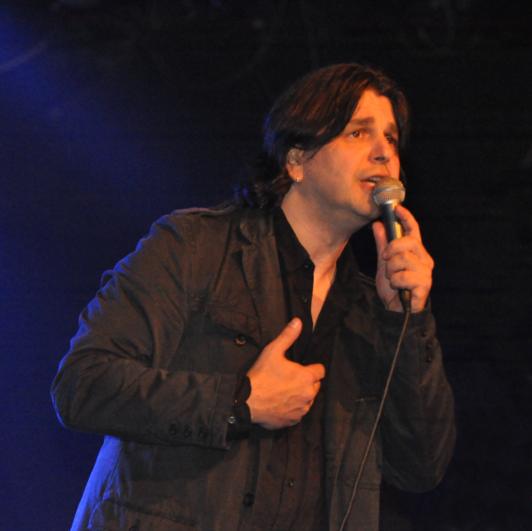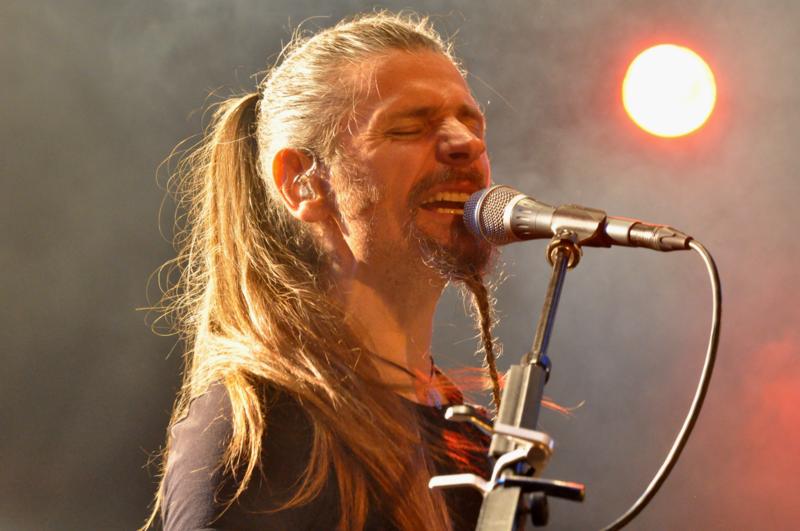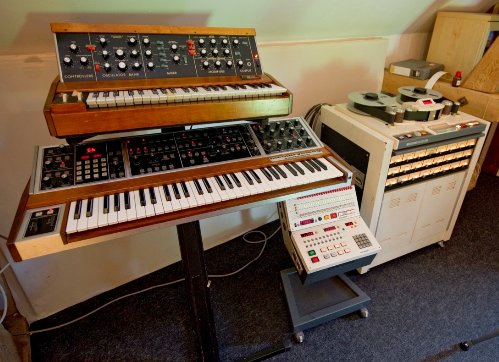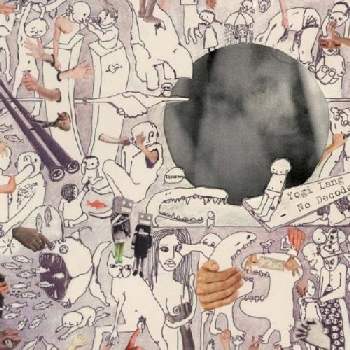|
Interview Yogi Lang “The album is all about communication and its limits” (November 2010, text by Henri Strik, edited by Peter Willemsen, live pictures by Arthur Haggenburg) After RPWL released their latest studio album The RPWL Experience in 2008, the musicians decided to do some solo material. So far albums from guitarist Kalle Wallner and bass player Chris Postl were released. The band released 'a best of' album entitled The Gentle Art Of Music (review), just before singer Yogi Lang released his album No Decoder (review). That was just the right time for Background Magazine to talk with Yogi Lang about his solo effort and RPWL. Has the album title No Decoder a special meaning? “Yes, it has. The album is all about communication and its limits. The words we daily use have a different meaning for each of us. For example, a word like 'home' has a certain meaning to us all. If I sing about 'home', I activate a picture in your mind. That picture is most likely different to mine and to everyone else. So, in everything we say there is a pre-programmed misunderstanding. There is no decoder for the worlds between us as individuals. Knowing that, it's the first part of 'trying' to understand each other. However most of the time, we simply expect our counterparts using the same pictures than we do. This is one of the basic errors in understanding each other. That is what No Decoder is about. But it's no concept album or anything like that.”How did you manage to have Guy Pratt of Pink Floyd fame playing the bass guitar on your album? “That was very simple. I knew him by a good friend of mine and I sent him some of the demo recordings. He said yes, came to the studio and we recorded. It was cool because he not only did a fabulous job on his bass, but he also gave a great input for some songs.”Most band members release a solo album to do something different music wise. No Decoder definitely has a Pink Floyd and RPWL-sound. How important are Pink Floyd for you? “Well, it's the music I grew up with. So I think it will always be part of my life. This time the difference is in the lyrical content rather than in the music. In fact, I think it's quite different, but with the same singer it will always tend to have similarities.”Would you please introduce your fabulous guitarist Thorsten Weber? “I saw Thorsten playing guitar with a band called The Doors Of Perception, a huge German Doors tribute band. I completely fell in love with his way of playing. I was the engineer of the festival on which he played and so I had the chance to ask him if he would join my solo project. After listening to the demos he said yes and we had a good time in the studio. With his way of playing guitar he wonderfully coloured the music of the whole record.”Ex-RPWL member Manni Müller played the drums on No Decoder. Why did he leave the band and what was the reason you asked him again for this album? “I asked Manni in a very early state of the production. I started to record the first demos and gave him a call. I knew it was perfect for his style of playing drums. I love his way to make a song groove. He never tries to show his drumming like many other drummers do; he just wants to be part of a song. This was the musical ability I needed for my songs. He left the band after The RPWL Experience, because he no longer could make enough time for the band. He introduced his friend Marc, who became our new drummer.”Ian Salmon (Arena) didn't play a single note on No Decoder, but instead he's the narrator on A Million Miles Away. Would you explain this? “Well, this was more by chance. He was in the studio and after listening to his voice I asked him to narrate the song on the album. This part is very important because it's the vehicle of the story of the song. I was so happy that he would accept it; he just did a great job.”Did all guest musicians record their parts at the Farm Studios or somewhere else and sent it by use of the internet? “Everything was recorded in the Farm Studios except the vocal part of Alison. Dominique recorded that in his own studio. They were quite busy with Lazuli at the time and the tracks he sent me were so cool that there was absolutely no need to re-record them. He did an awesome job indeed!”Did you ask other musicians to play on your album? “No. I really had my dream team in the studio.”In the album credits it says that you also played guitar on the album. Which parts you played yourself? “This time I wrote the entire album on guitar, so I did some of the rhythm guitars and on a couple of songs the effect guitars. However, the main guitar playing was the splendid work of Torsten. I'm definitely no guitar player.”On many RPWL-tunes and on some of your solo pieces either your tasteful synthesizer solos reminded me of Manfred Mann. Do you know him and has he inspired you? “He definitely is one of the reasons I started to play music. I remember being fifteen years old and buying my first Moog. I only had a bike then, so I had to transport the Moog Prodigy over 30 kilometers without having a case on the bike rack. Well, that must have been a wonderful sight.”
Many keyboard players who record a solo album are showing off how good they are by playing keyboard orientated songs. I didn't hear that on No Decoder. Why didn't you do so because the album's got a real band sound with sometimes a leading role for the guitarist? “I'm more a songwriter than a keyboard player. I never had the interest to play as fast as whoever. I've always been more into producing than into playing. I love to have different musicians playing and if there's a chance to have a good keyboard player I'd have no problem to let him play.”How many labels were interested in releasing your album? Or was it planned to release it on your own label? “Indeed, it was planned for our own Gentle Art Of Music-label. After the crash of SPV we built our label with a new structure. It gives us the freedom to be creative and doing whatever we want to do. We're very happy about that and we're already planning forthcoming releases.”Can we expect more solo efforts? What are the future plans? “Next will be the new RPWL-album that should be released in autumn 2011. Maybe there will be a couple of gigs in spring 2011 to present No Decoder. We'll see.”Thanks for releasing a wonderful solo album and answering my questions! “You're welcome.”More info about Yogi Lang on the Internet: - Website Yogi Lang - Website RPWL - Review 'No Decoder' - Review RPWL album 'Gentle Art Of Music' |



